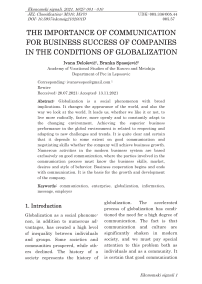The importance of communication for business success of companies in the conditions of globalization
Автор: Đelošević Ivana, Spasojević Branka
Журнал: Ekonomski signali @esignali
Статья в выпуске: 2 vol.16, 2021 года.
Бесплатный доступ
Globalization is a social phenomenon with broad implications. It changes the appearance of the world, and also the way we look at the world. It leads us, whether we like it or not, to live more radically, faster, more openly and to constantly adapt to the changing environment. Achieving the superior business performance in the global environment is related to respecting and adapting to new challenges and trends. It is quite clear and certain that it depends to some extent on good communication and negotiating skills whether the company will achieve business growth. Numerous activities in the modern business system are based exclusively on good communication, where the parties involved in the communication process must know the business skills, market, desires and style of behavior. Business cooperation begins and ends with communication. It is the basis for the growth and development of the company.
Communication, enterprise, globalization, information, message, employer
Короткий адрес: https://sciup.org/170204046
IDR: 170204046 | DOI: 10.5937/ekonsig2102001D
Текст научной статьи The importance of communication for business success of companies in the conditions of globalization
Globalization as a social phenomenon, in addition to numerous advantages, has created a high level of inequality between individuals and groups. Some societies and communities prospered, while others declined. The history of a society represents the history of globalization. The accelerated process of globalization has conditioned the need for a high degree of communication. The fact is that communication and culture are significantly shaken in modern society, and we must pay special attention to this problem both as individuals and as a community. It is certain that good communication
Ðelošević, I. et al., The Importance of Communication for Business Success of
2. Business communication framework in the global environment
We live in a world in which countries are interdependent and connected. Changes are visible every day, because the world is changing very quickly. Communication culture plays a significant role both locally and globally. We communicate to satisfy ventures and desires in both the private and business fields. We exchange information, communicate through various sign systems, symbols and behaviors. Each of us wants to present our business. The purpose of communication, among other things, is to gain credibility and establish good, cultural and productive relationships with clients. Research conducted in many companies indicates that directors spend about 50% of their time in communication with others. Therefore, the role of cultural norms and rules of conduct impression is the way for further business cooperation. This, along with others, reflects the effect of advanced globalization.
In today’s turbulent business environment, effective business presentation has a large and essential role and significance. The ability to speak, write, communicate are key determinants of success in many industries. -lthough needed for personal and professional success, an effective business communication requires time, patience and effort. - successful communicator must have certain skills and the ability to anticipate certain situations so that things do not go wrong. Furthermore, attention should be focused on the disturbances or obstacles that may occur in the communication channel and which are caused by differences in the level of education, culture, customs, rituals and other sociological factors. So, there are many reasons why communication can be ineffective, so you should carefully consider the circumstances, factors, barriers and other elements. Getting feedback, whether verbal or nonverbal, is a useful sign that communication has achieved its goal. Numerous research studies emphasize the importance these forms of communication in international negotiations.
The accelerated process of globalization in the world has conditioned the need for a high degree of communication of individuals who are part of the business world. The business process is characterized by ups and downs. It is quite clear and certain that it depends to some extent on good communication and negotiating skills whether the company will achieve business growth. Numerous activities in the modern business system are based solely on good communication, where the parties involved in the communication process must know the business skills, market, desires and style of behavior. Numerous studies indicate that 50% of the impression made by the communicator is conditioned by body language and approximately 10% by the content of what is said. So, communication is one of the main elements of corporate success.
In addition to knowing and respecting the rules of international business communication, it is very important for companies operating in the domestic market to know the local customs, habits, traditions and culture of people from certain backgrounds. Such an attitude and attitude towards business partners from different backgrounds will contribute to better business cooperation and the company's reputation.
The essence of good communication skills implies the ability to present information in a clear, unambiguous and simple way. Good communication means presenting information, understanding instructions, compiling reports, giving consent, asking questions, listening to interlocutors, correct transmission of information, speed of transmission, etc. The above represents the steps or phases towards achieving the business goal, because if there is a communication error, it is impossible to realize the vision of the business venture. In today's competitive market, communication skills are very important and employers strive and look for workers who own them, because careful listening and presentation are characteristics that should be appreciated.
3. The importance of communication and business culture
Communication and culture are two causally consequential elements that define the world of business cooperation between individuals and groups. The communication process is the sum of several factors such as the number of parties involved, issues to be analyzed, deadlines, physical and social environment, customs, culture, ethics, etc. Consumer culture shows us what is socially desirable and acceptable among members of a particular community. Culture shapes value and determines cultural norms and rules of behavior. It is a universal phenomenon and is found everywhere. The higher it is, the easier and simpler the possibilities of communication are.
-ctually, each of us belongs to a number of cultural groups. Culture affects the individual through language, beliefs, values, customs, folklore, symbols, work habits, etc. Each culture has its own pattern of behavior that seems unknown and foreign to people from other cultures, so they are often disoriented when being in a new culture. In such a situation, the possibility of business communication is difficult due to different cultural habits. Therefore, the process of acculturation is an important element in international communication.
Communication is completely dependent on culture, which implies knowledge of the language and its grammatical structure. Literacy significantly affects the process of communication and the language value system. Therefore, culture is a way of mediating between the individual and the society.
-long with the language of our culture, we learn a nonverbal style of behavior. If we speak a foreign language well, we also have a non- verbal style of behavior of the culture whose language we speak. The connection between communication and culture is inevitable. Through the process of communication, our behavior, appearance, skin color, clothing style are expressed, which all affects how the message will be interpreted. The essence of the communication pattern lies in the values of the culture we come from and the social class that we belong.
In the business world the style of dress is an important part of communication, which is again part of the culture of a nation. Clothes are a reflection of our identity; it speaks about our values, which certainly affects business communication. Our character is recognized through the choice of clothes we wear, which strengthens our position in society. By dressing we show respect for business partners, which in verbal and nonverbal communication can prove to be a good kind of action. Building a business style is conditioned by numerous factors: behavior, personal appearance, clothing, voice qualities and communication. Elements of our environment, such as space, volume, size, light, color of furniture are also important tools that dictate the type of nonverbal communication. The so-called artifact code belongs to the circle of non-verbal communication.
4. Communication - the basis and key to successful business
We communicate in order to meet our needs privately and socially. We communicate to leave an impression on employees, suppliers, business partners, to gain credibility, to establish successful cooperation to the mutual satisfaction. Whether and how important it is, shows the daily cooperation of people from the business world, numerous meetings, gatherings, exchange of opinions and ideas. -ll of the above shapes business communication. Therefore, in order to be successful, companies must create an environment in which employees and other participants in the chain perform their work by encouraging effective communication.
When we talk about organizational communication, we mean the flow of information, data and ideas within the organizational structure. Regardless of the position in the company, occupation, education, rank, etc., the communication skills affect not only the success of the company, but also our personal success. Communication in an organization essentially comes down to sending messages (internal - intended for the recipient within the enterprise and external -intended for the recipient outside the enterprise). The goal of communication in the organization, or so-called group communication, is to achieve better results through the cooperation of several people from the group than it would be achieved individually.
further business depending on how the employee is presented. Having a good team and good communication is extremely important. No matter how good the product you place, the favorable price, promotion, distribution and other elements of the marketing mix, if you do not have cooperation and communication both inside and outside, the company may experience failure in the market.

Communication "downward"


Work tasks
Business rules
Ob:ectives
Business responsibility
Business performance
Ideas, plans and suggestions


Business results
Business problems Report presentation Knowledge of employees Identifying the problem
Communication "upward"
Figure 1: Forms ofcommunication in the company
5. Research-communication and business success of the company
The distribution and structure of respondents according to the answer to the question:
""How important is communication for the business success of a company in the conditions of globalization?"
Sample statistics, arithmetic mean, show that the average response of the respondents is partially important (4.02). The table shows the distributions of absolute and relative frequencies of the answer variable to the question. Based on the data, it can be concluded that no respondent thinks that communication is absolutely unimportant, and that only 10 or 8.3% of respondents think it is partially unimportant. The largest number of respondents think that it is very important (47 or 39.2%), and a total of 85 or 79% think it is partially important and very important. The number of respondents who think it is both important and unimportant are 25 or 20.8%.
Table 1: Distribution of respondents according to the answer to the question: "How important is communication for the business success of a company in the conditions of globalization?"
|
-nswers |
Number of respondents |
% participation |
Cumulative % participation |
|
-bsolutely unimportant (1) |
0 |
0,0 |
0,0 |
|
Partly unimportant (2) |
10 |
8,3 |
8,3 |
|
Both important and unimportant (3) |
25 |
20,8 |
29,2 |
|
Partly important (4) |
38 |
31,7 |
60,8 |
|
=ery important (5) |
47 |
39,2 |
100,0 |
|
In total |
120 |
100,0 |
Figure 2: Histogram of the number of respondents according to the answer to the question:"How important is communication for the business success of a company in the conditions of globalization?" *

Communication and business success
* Source: based on data from the previous table
6. Conclusion
The family, the company, the community, the organization and other sub:ects in the socio-economic system must have, maintain and respect certain rules in order to function successfully. The efficiency of relationships in a community depends on many factors among which the communication is one of the most important. Communication rules, way of communication, communication channels and other elements can be defined in one way or another, but it depends exclusively on individuals whether the communication will leave an impression on colleagues, business partners, friends, etc. It often happens that the company has a good organizational structure and operates successfully, but insufficient and direct communication of employees can affect the lack of optimal results. It clearly feels and sees at first sight (whether it is a shop, school, pharmacy, theater, etc.) a good atmosphere, harmony in the team, pleasantness and cheerful spirit, which is a consequence of good communication between employees and employers. On the other hand, an unpleasant atmosphere and rudeness create tension and coldness, which is a consequence of poor communication and all this certainly leads to poor business results of the company. From the above we can conclude that the skill of communication
Список литературы The importance of communication for business success of companies in the conditions of globalization
- Aaker, D., Kumar, V., Day, G. (2008) Marketinško istraživanje. Beograd: Ekonomski fakultet
- Bovee, C.L., Thill, J.V. (2012) Savremena poslovna komunikacija. MaTe d.o.o
- de Bussy, N., Ewing, M., Pitt, L. (2003) Stakeholder theory and internal marketing communications: A framework for analysing the influence of new media. Journal of Marketing Communications, Issue 9, str. 147-161
- Ilić, S. (1997) Psihologija potrošača. Beograd: Izdavačka agencija Draganić
- Kotler, F., Vong, V., Sonders, Dž., Armstrong, G. (2007) Principi marketinga. Beograd: Mate
- Lehman, C., Dufrene, D. (2015) Poslovna komunikacija (BCOM). Beograd: Data status
- Mcdaniel, C., Hair, J., Lamb, C. (2013) Marketing. Beograd: Data status
- Milovanović, S. (2017) Svet poslovne komunikacije. Beograd: Akademska misao
- Milovanović, S., Jovanović, Z. (2018) Uvod u poslovnu komunikaciju. Beograd: Anademska misao
- NLP Institut (2021) Važnost vešte komunikacije. httns://www.nlninstitut.com/vaznost-veste-komunikaciie/
- Ognjanov, G. (2013) Marketinške komunikacije. Beograd: Ekonomski fakultet
- Solomon, M., Bamossy, G., Askegaard, S., Hogg, M.K. (2015) Ponašanje potrošača. Zagreb: Mate


